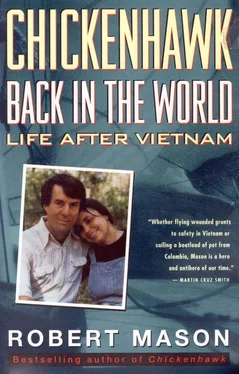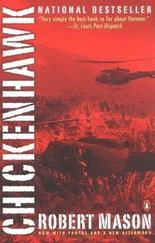Robert Mason - Chickenhawk - Back in the World - Life After Vietnam
Здесь есть возможность читать онлайн «Robert Mason - Chickenhawk - Back in the World - Life After Vietnam» весь текст электронной книги совершенно бесплатно (целиком полную версию без сокращений). В некоторых случаях можно слушать аудио, скачать через торрент в формате fb2 и присутствует краткое содержание. Год выпуска: 2013, Издательство: BookBaby, Жанр: Старинная литература, на английском языке. Описание произведения, (предисловие) а так же отзывы посетителей доступны на портале библиотеки ЛибКат.
- Название:Chickenhawk: Back in the World - Life After Vietnam
- Автор:
- Издательство:BookBaby
- Жанр:
- Год:2013
- ISBN:нет данных
- Рейтинг книги:3 / 5. Голосов: 1
-
Избранное:Добавить в избранное
- Отзывы:
-
Ваша оценка:
- 60
- 1
- 2
- 3
- 4
- 5
Chickenhawk: Back in the World - Life After Vietnam: краткое содержание, описание и аннотация
Предлагаем к чтению аннотацию, описание, краткое содержание или предисловие (зависит от того, что написал сам автор книги «Chickenhawk: Back in the World - Life After Vietnam»). Если вы не нашли необходимую информацию о книге — напишите в комментариях, мы постараемся отыскать её.
Chickenhawk: Back in the World - Life After Vietnam — читать онлайн бесплатно полную книгу (весь текст) целиком
Ниже представлен текст книги, разбитый по страницам. Система сохранения места последней прочитанной страницы, позволяет с удобством читать онлайн бесплатно книгу «Chickenhawk: Back in the World - Life After Vietnam», без необходимости каждый раз заново искать на чём Вы остановились. Поставьте закладку, и сможете в любой момент перейти на страницу, на которой закончили чтение.
Интервал:
Закладка:
I nodded. “Someday you will have to land here.” I rolled on the throttle and pulled up the collective to lighten the Hiller on its skids. “We will fall out of here,” I said.
“Sir?” the student said, looking worried.
We rose, rearing back—falling off the cliff. When the nose cleared the ledge, I fell into the valley. The trees and the ledge sailed above us as we sank. The tail naturally wanted to swap ends as we fell backward, like an arrow tossed feathers first. I pressed the right tail rotor pedal and we snapped around. I dove to gain airspeed. At sixty knots, I swooped up and we soared up and out of the valley. Student said, “Wow!”
I am building a model airplane, a World War I Spad. A plastic Spad from a kit. It is three-thirty in the morning. Patience and Jack went to bed six hours ago. My tongue peeks out my mouth as I concentrate. I’m sticking pieces of cellophane onto the wings to create the effect of wrinkled fabric. My model is extremely detailed, but I left the little pilot head-and-shoulder figure in the box. The cockpit is empty. I rub silver paint on the tiny instrument panel.
While the Spad dries, I look at my photographs on the wall. They look dismal to me. Sad attempts to see the world as I once saw it. Patience picks flowers, wind blowing her hair. The gate to the old farmhouse swings as a blur, nobody there. The ghost second lieutenant is talking on his radio, full of plans. They are good, these photographs, but disturbing. I get up from the table and walk down the hall. Jack, bathed in moonlight, is tiny, his little chest breathing. Patience is beautiful; long dark hair hiding the pillow, she sprawls, taking up most of the bed. They are peaceful.
By four, the Spad’s war-worn paint job is dry. I hold it and strafe the salt and pepper shakers. I’m aware that I am a grown man playing with a model airplane and that I don’t make model airplanes. But it is a nice model. I take it to the corner cupboard and set it on a shelf. I stand back and admire my work, knowing I’ll never do it again.
I open the cupboard to put the box of tools and glue and paint away. The top shelf is packed with bottles of bourbon my students have been giving me when they complete their cycles. Four students per cycle, one cycle every two months; lots of booze. Don’t drink now. Drank some in Vietnam. Remembered how it tasted: warm canteen water and Old Granddad in a canteen cup, laughing friends. Good. Pull Old Granddad from the shelf and put him on the table. Get glass. Pour in three fingers of Old Granddad. Splash in water at the sink. Drink. Asleep beside Patience by four-thirty.
Flying in from the boonies with my last student of the day, I saw that a long grassy meadow we used for autorotation practice was clear. We were at cruising altitude, five hundred feet, and my student was concentrating on getting himself into the traffic jam of returning helicopters without hitting anyone—the last thing he needed was to have the engine quit. I rolled off the throttle, cutting the power.
The strip was to our right, the wind was coming from the right, so the student bottomed the pitch and turned to the right. I still didn’t know for sure if he saw the strip, but he was doing everything okay so far. He did a few shallow turns on approach to lose altitude to get on the right glide angle, and I saw he knew where he was going. I decided to let him take it all the way to the ground—a rare treat because the brass said we were breaking too many helicopters teaching pilots how to autorotate to the ground. Something flickered in my peripheral vision. I looked. A Hiller was coming down on us.
I take the controls, telling the student I’ve got it. In a very strange way, I don’t exactly mind this. Everything is happening in slow motion. It reminds me of the feelings I used to have during the assault landings. It is instantly obvious to me that there is no way to escape collision, but I want to be flying when I die. We’re both autorotating to the same spot. The other Hiller is so close that if I try to get away my rotors will tilt up into his skids when I turn. He’d lose a skid; we’d lose our rotors. Can’t go down any faster; we are both descending as fast as possible—we are both autorotating. His ship descends just a little faster than ours. We will hit soon. It is almost funny: Make it through Vietnam; killed in a peaceful meadow just outside Mineral Wells, Texas. One wrong move.
We’re a little off course for the strip. The student in the ship above us turns slightly to correct and sees our rotors just below him. At about a hundred and fifty feet, his ship lurches away and we are safe. Total time for event: about ten seconds.
I come to a hover on the strip. My student is pale and pissed. Why didn’t they clear themselves before they started their autorotation? I ask if he’d seen them. No. Good lesson, then, on keeping better lookout. He stares at me, nodding slightly.
It made a good story to tell my fellow instructor pilots back at the flight room. I jazzed it up with gestures and smiles, to make sure everybody knew I was scared shitless. They laughed. Been there, Bob.
It was Friday, so I decided to take both my flight suits home to wash. Grabbing my alternate flight suit that had been hanging in my locker for two weeks, I felt a bulge in one of the leg pockets. Zipped it open and found a thumb-sized barrel cactus wrapped in a slip of paper from my grade book. Ah, that was from that confined area on top of that hill toward Palo Pinto, I thought. I marveled at the plant, healthy and happy even in a stinking pocket. I took it home for Patience.
Patience liked the cactus. She put it in a pot and set it in the window. I was happy she liked little things.
Saturday morning we drove fifty miles to Fort Worth. We did this almost every Saturday: got a box of Kentucky Fried Chicken and ate it in a park. Went to the Fort Worth zoo and watched caged animals stare back, nutty and distracted. (We once saw a woman strenuously making faces at a gorilla, trying to get its attention. After watching her awhile, the gorilla gave her four bored claps and turned away.) Jack really liked the zoo. We rode in a miniature train that made him laugh. Patience rode the merry-go-round. Dinner was usually at Jimmy Dips, a Chinese place. We were on the road to Mineral Wells by nine or ten. Every Saturday, almost.
Sundays were quiet. I read, or worked on short stories. I wrote stories and thought of having them published someday. This Sunday I sat in a chair in the bedroom, reading. Suddenly my heart leapt and jerked. I sprang up, threw the book on the floor, and breathed out hard. I felt like I was dying.
“Patience,” I hollered, “I must be having a heart attack.” She rushed me to Beach Army Hospital, Jack in the back of the car. I took deep breaths with my face next to the air conditioner vents.
I explained what had happened. The flight surgeon felt my pulse and smiled. Funny stuff? “No,” he said, “you’ve been hyperventilating.”
“What’s that?”
“You’re accumulating more oxygen than you need because you’re breathing wrong.’’
“Breathing wrong?” Been breathing for twenty-five years.
“Tension, maybe,” the doctor said. “Next time you feel like this, try breathing in and out of a paper bag. That’ll increase your carbon dioxide level and the feeling will go away.”
Simple stuff. Drink myself to sleep at night and breathe out of paper bag to make it through the day. Could be worse: just met a classmate, Wavey Sharp, best-looking guy in our class, but not anymore; his face was burned away in Vietnam.
Hughes trainers were falling out of the sky and no one knew why. Only helicopters with instructors were crashing; solo students weren’t going down. No clues. The ships were found, what was left of them, pointing straight down. Veteran instructor pilots and their students suddenly dove to the ground and ended up as wet stuff in the wreckage. A guy in the flight unit who found one of these mangled messes cried about it.
Читать дальшеИнтервал:
Закладка:
Похожие книги на «Chickenhawk: Back in the World - Life After Vietnam»
Представляем Вашему вниманию похожие книги на «Chickenhawk: Back in the World - Life After Vietnam» списком для выбора. Мы отобрали схожую по названию и смыслу литературу в надежде предоставить читателям больше вариантов отыскать новые, интересные, ещё непрочитанные произведения.
Обсуждение, отзывы о книге «Chickenhawk: Back in the World - Life After Vietnam» и просто собственные мнения читателей. Оставьте ваши комментарии, напишите, что Вы думаете о произведении, его смысле или главных героях. Укажите что конкретно понравилось, а что нет, и почему Вы так считаете.












